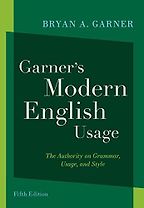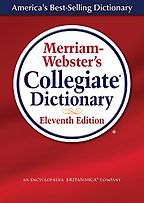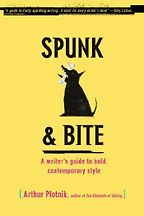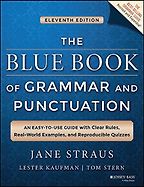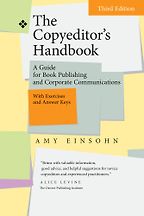We’re talking about grammar books today, but I originally got in touch with you because I was editing the word ‘Pitmaston Pineapple apple tree’ in one of our interviews. That led me to your post, on Daily Writing Tips, about when to capitalise animal and plant names. I gathered from the post that people generally capitalise too often. Taking a step back, does it actually matter, getting that kind of detail right?
It’s interesting because I am very conservative in some respects, as far as language and usage is concerned in writing, but I also tend to welcome linguistic innovation. I just wrote a post about the fact that the word ‘hella’ has been added to Merriam-Webster’s Dictionary. I’m not sure if you are familiar with this term in England?
I’m not.
A lot of people in the United States aren’t either. It’s a sub-cultural term. It’s basically an intensifier based on ‘hell of a’ and it is used in phrases like, ‘Oh, that was hella cool.’ I wrote about how I was interested because I live in the San Francisco Bay Area, near where that word was born. That was an interesting experience, being near the epicentre or birthplace of a neologism.
But my feeling is that language is alive and we don’t really have any control over it. Even if we had an Académie française for English—some governing body for what you should and should not do in English—it would rebel against any authority. It is a living creature. That said, we need to maintain some degree of standards if we are to communicate effectively with each other. It is a slippery slope. My job, as an editor, is to maintain those standards. Otherwise, anarchy prevails.
Bad grammar could lead to anarchy?
Yes. I welcome breaking rules if you have a good reason to do so, but if you break rules prepare for the consequences. The consequences for a writer are that people may not understand you, and your message will not be communicated, and then you fail. So you’re taking a risk.
What’s the difference between the evolution of language and a mistake? For example, a word like ‘disinterested.’ At school I was taught that this meant ‘unbiased’ and that to use it to mean ‘uninterested’ was a mistake. But many people do now use it to mean ‘uninterested.’ When do we accept a word as having acquired a new meaning?
There’s an awkward transitional stage for some changes, at least in the timescale of one’s lifetime. Words like ‘disinterested’ or ‘fulsome’ can now mean two things. There’s a term for these words, which is ‘polyseme.’ The problem is that people may not understand which meaning you’re using, so why use it? At best, you can provide context in the sentence so that it is obvious which one you mean, but if you are trying too hard to provide a context, then you are just getting bogged down. It might be better just to use another word.
Let’s look at some of these issues in more detail as we go through the grammar books you’ve chosen. The first book on your list is Garner’s Modern American Usage by Bryan A. Garner. Tell me about this book. Why is it interesting?
This grammar book is the closest thing Americans have to a national authority. There’s an array of books that fill this niche; in England the Oxford English Dictionary might be the equivalent. Garner’s Modern American Usage just has this weight of authority to it. It is very carefully organised and prepared. It is very well written. The author is very well respected as a kind of arbiter of effective written communication. I just find it a great resource for making decisions about which word is most effective in conveying what I want to communicate to my audience.
Give me an example of what I can learn from the book.
There’s a habit, in American English at least, of using the word ‘bicep’ as if biceps is a plural and bicep is the singular. But ‘biceps’ is actually a singular noun, it just happens to have an ‘s’ at the end because it is based on the Latin, and Latin does that sometimes. So Garner will tell you that if you want to be considered a careful writer, if you want people to respect you as an authority when you are writing, then you are not going to talk about your left ‘bicep,’ you are going to talk about your left ‘biceps.’ It gets into that laser-like level of detail about the right thing to do if you want people to feel that they can trust you.
Which matters. If I’m applying for a job and my grammar is wrong, that will not make a good impression.
There is a concept called ‘linguistic register,’ which is a fancy way of saying how formally you write (or speak). When you are preparing a business report or writing for a scientific journal, the way you write is intrinsic to how well you are perceived as an authority and how persuasive your argument is. If you are writing a blog, and you write about how something is ‘hella’ cool, if your blog is engaging with people on a conversational level, that’s an appropriate linguistic register. Or if you use the word ‘phat.’ Are you familiar with that? It’s from rap culture, and it means ‘great!’ ‘That’s phat, man, that’s phat!’ It’s a dated term, but if your audience knows what that means, then you can be ‘sloppy’ because you are still communicating effectively.
Yes, but whether you’re being formal or informal if you use it’s (with an apostrophe) when you are supposed to use ‘its’ (without an apostrophe), that looks bad across the board, doesn’t it?
Do you know the term for that? It’s called the ‘greengrocer’s apostrophe,’ and actually originates in the United Kingdom. It’s called that because the mistake is so ubiquitous in storefront signs, where it’ll say ‘Apple’s for Sale’ because the person who wrote it doesn’t know the function of the apostrophe. Unfortunately, that error is also common in other contexts, and it’s hella bad.
While we’re on the subject of apostrophes, what about if you are talking about an object belonging to Mr Jones. Should it be Mr Jones’s or Mr Jones’?
It depends on who I am writing or editing for because they are both correct. They’re just alternative forms — just like American English and British English are both valid in their own contexts. Some publications prefer the terminal s and some publications prefer to omit it. It depends on which style you are using. But it’s confusing because a layperson will be reading a newspaper and they’ll see Jones’ with just an apostrophe. Then they’ll read a book and see Jones’s with apostrophe s. They’ll wonder which one is wrong because they don’t know the distinction. They don’t know that it can be either.
Are there huge variations in English between countries? I’m always quite surprised at the difference between American English and British English, for example.
The best way to think about it is as two separate languages. It’s almost like French and Italian, or maybe it would be more accurate to say the difference between two French dialects —Provençal or Occitan. Or between Portuguese in Portugal and Portuguese in Brazil.
Five Books interviews are a bit of a mishmash. If I like the American style on something—like italicizing book titles—I’ll adopt that. If I prefer the British, then I’ll adopt that.
I’ve actually edited British English and it can be quite confusing. For example, the use of ‘ise’ or ‘ize’ or the use of ‘ise’ or ‘ice’ at the end of a word like ‘practice.’ It can get confusing for an American because we just do it the same way every time. The British don’t. A similar case is whether you place terminal punctuation inside or outside of a quotation mark. In British English, it varies and not only that, but some British publications follow American style and some follow British style. So you just have to know which rulebook you are supposed to use, when you work, as I do, as an editor.
Going back to the grammar books you’re recommending and Garner’s Modern American Usage. The tone is quite interesting, isn’t it? One of the reviewers on Amazon said he can be quite snarky.
He comes across as a bit stuffy, but he is one of those people who is stuffy and yet witty — droll, I guess you would say. Sometimes, his humour is droll or dry, but his writing style is basically do-what-you’re-told. He is confident in his writing: ‘If you are opening up this book, you are in my grasp and I am telling you what to do. Do it.’ It’s a great approach because the reason I’m opening this book is because I’m confused or uncertain about something and I want authoritative advice.
Bryan Garner is a lawyer, isn’t he? How did he get to this position as the American equivalent of the Académie française?
Just as with any authority, you accumulate authority. You start out being just another person casting about in the darkness, and then you become the light yourself. He was editor in chief of a law dictionary, Black’s Law Dictionary, and then he started branching out to general-purpose language usage.
Is he the ultimate arbiter, would you say, if you had a point of uncertainty?
He is an ultimate arbiter. His is one brand of many that are possible. I just happen to prefer him, which is the case for all the books that I chose for this exercise.
Tell me about the second of the grammar books you’re recommending, Merriam-Webster’s Collegiate Dictionary. Why is this an essential book?
In the United States it is considered, among publishing companies, to be the dictionary of record. What I mean by that is that if you go into the offices of a publishing company, you are not going to see various dictionaries on people’s bookshelves as you take a tour. Everybody is just going to have Merriam-Webster’s. I chose it because I felt there needs to be a dictionary on this list of five books because dictionaries are fundamental.
A lot of people criticise Merriam-Webster’s because it is not necessarily clear – just because a word is in the dictionary, it doesn’t mean you should use it. For example, Merriam-Webster’s includes the word ‘irregardless.’ You might come back to me and say: ‘Irregardless is not a word. It is a duplicative of regardless. It is a ridiculous word.’ But I will respond, ‘Yes, it is a word. I just used it.’ It doesn’t mean that it is a good word, but it exists. There are a lot of things in this world that we wish didn’t exist but they do, and ‘irregardless’ is one of them.
What people should realise—and this is a point a lot of editors and writers don’t realise, as well as laypeople—is that dictionaries are descriptive and not prescriptive. They describe the way things are, not the way things should be. A dictionary includes every word that is used including our ‘hella.’ It is not saying you should use this word. It is saying this word exists, and if you are going to use it, this is how it is spelled and this is what it means and this is how it is pronounced. I’m not sure if everybody would agree that Merriam-Webster’s does a better job of that than any other dictionary, but it happens to be my preference just because it is the dominant resource among publishing companies, who have traditionally been the arbiters of the best of language and written communication.
Does the fact that it’s ‘collegiate’ mean anything?
No, I think it’s just a marketing term. It’s like, ‘Hey kids, this is what you should buy if you want to pass your midterms.’ I think it was distinguished from the general Merriam-Webster’s Dictionary because it was more compact; it didn’t have as many words in it as the general edition. It was marketed as a smaller, cheaper alternative for college students. But it superseded the previous version of the dictionary, and is now the prevalent version.
Can dictionaries contradict each other?
They do, but it’s insignificant. Except if you are supposed to spell something the same way every time, which is, you know, the idea. One of them might close a two-word compound, the other might hyphenate it. For example, the word ‘mindset’ has traditionally been hyphenated, but a lot of people are treating it as closed now, so you’ll find it that way in some dictionaries because dictionaries, as I said, are descriptive.
Get the weekly Five Books newsletter
The interesting thing is, why do dictionaries contradict each other? One dictionary says it’s ‘mind-set’ with a hyphen, and another one says it’s closed. They are both citing sources; they’ll cite a book or a magazine or some other printed content or even a website that that spelling appeared in, and say, ‘Look at all these resources — they’re saying you don’t hyphenate ‘mindset’ any more.’ Another dictionary will say ‘Yes, you hyphenate “mind-set,” and look at all this evidence that we have accumulated.’ Again, they are both right because the word is in transition and you’ll see it treated both ways. They’ve just made different decisions about what the prevailing form is for a word.
If your publication uses Merriam-Webster’s to resolve any issues of spelling or style, then you’re going to do what Merriam-Webster’s says. And if somebody says, ‘Our dictionary of record is Random House’ and Random House closes ‘mindset,’ you’re going to do it that way. There’s also the house style. A lot of publications have their own resource. They might want to generally follow a resource like Merriam-Webster’s or the Chicago Manual of Style or the Oxford Style Guide, but they will say, ‘Except in this case, when we are going to do it this way instead.’ So they’ll have a separate guide, which is a separate document that will say, ‘These are the exceptions to the dictionary or the style guide that we want you to use.’
On to the next of the grammar books. Tell me about Spunk & Bite: A Writer’s Guide to Bold, Contemporary Style.
This book, as you might have figured out, is a rebuttal to Strunk & White. We just call it Strunk & White here, us editor types, and everybody knows what you’re talking about. I don’t even remember what the real title is [The Elements of Style]. Strunk & White is widely respected as a very handy little resource for basic rules about writing clearly: be concise, don’t overload your sentences with adjectives and these kinds of prescriptions. Dictionaries are descriptive, but things like Garner’s Modern American Usage and Strunk & White are prescriptive: they say, ‘This is what you should do.’ I recognise the value of Strunk & White, but as I alluded to earlier, I’m all about being open to breaking rules. I really admire the author of Spunk & Bite for basically turning Strunk & White upside down and saying: yes, but no. If you want to load your sentences with adjectives, lots of great writers do that. OK, Hemingway doesn’t, but somebody else does. So if you want to sound like Hemingway, then no adjectives are allowed. If you want to sound like somebody else, then dump the wheelbarrow full of adjectives into every sentence, and go for it. I just appreciate that sense of ‘Know the rules, but then break them, if it works for you.’
There is a writer named Bill Bryson. You might be familiar with him. He is an American but he has spent a lot of time in the UK. He was actually chancellor of Durham University. He just writes about whatever he wants to write about. He uses these very long and involved, convoluted sentences, full of adjectives, full of whimsy, and it’s brilliant. Not everybody loves him, but I do. Anybody who likes him will probably like Spunk & Bite.
Is Strunk & White a bit dated?
It’s hasn’t been updated in quite a long time. I don’t know when the last edition came out. It was originally written in the early 1900s. A fellow named William Strunk Jr. started it, and then E. B. White, a student of Strunk and a writer best known as the author of the children’s classic Charlotte’s Web, took on the task of revising. I think he did that more than once, but it was a long time ago.
Let’s go on to The Blue Book of Grammar and Punctuation, which is a very popular grammar book. I noticed this was available online as well, which is quite useful. I went online and read an entry about the semicolon, which has always intrigued me because at school we were told that it was so hard to use correctly that it was better not to use it at all.
The semicolon is one of those tiny things that people are just terrified about. Just think of it as having two roles — it’s either a strong comma, clarifying the organization of a sentence that contains a list when one or more parts of the list already include a comma, or it’s a weak period, separating two closely related statements. I consider myself a word nerd and a grammar guru, but I’m still learning all the time. And I’m wrong sometimes: I’m a human being. But when I was in school, I remember having instruction in proper English grammar and punctuation. It was basically worksheets. It was very dry, very boring. I was generally pretty good at it, but well into my adulthood I still didn’t know the difference between an adjective and an adverb. That is, I didn’t know which label referred to which, but I knew how to use them. If someone had given me a mnemonic — think of the -verb in adverb, and adjective goes with -ject, as in object — I would have been on more solid ground. The way language is taught is just so formulaic and laboratory-driven. It’s not organic; it’s not holistic. And so we acquire these fears of semicolons. We have advertising agencies just refusing to use hyphens, because ‘They confuse people.’ When you see billboards or advertisements, nobody ever uses a hyphen, or if they do, they use it incorrectly. It flummoxes me, as an editor, because I know when and how to use it. I just don’t understand phobias about punctuation marks, though I do appreciate that somebody might know how to use some tool or some procedures for their work which I would be utterly confused about.
So is this a good grammar book to go to for that kind of specific query?
This book is good for beginners, but I also find it helpful for people who might consider themselves experts. Just, you know, for those moments when I think I remember what I’m supposed to do, but I want to look it up just in case.’ I find it useful for that. It’s very clean, and it’s in a workbook format with many exercises in it, which is a good thing. You read a short, simple lesson about adjectives and adverbs, or about when you use ‘that’ or ‘which’ in a sentence, and then you can practise with the exercises.
When do you use ‘that’ and when do you use ‘which’?
In British English, you always seem to use ‘which.’ I don’t think ‘that’ exists in British English, does it? Just kidding. But in American English, we make a distinction between restrictive or non-restrictive usage. So, for instance, I might say, ‘The book that is on the table is mine.’ I wouldn’t say, ‘The book which is on the table is mine,’ unless I was being parenthetical in saying, ‘The book, which is on the table, is mine,’ and setting that off with commas. Those two sentences have different intentions. ‘The book that is on the table is mine,’ kind of sounds as if there might be more than one book, and I’m specifying which book it is. The second sentence, ‘The book, which is on the table, is mine,’ doesn’t require any other books to exist. I am merely providing additional information about the book.
And people get that wrong a lot?
Yes, they do, with distressing frequency.
And you are saying British English is different?
My understanding of British English is that—and this happens in American English too—people will say, ‘The book which is on the table is mine,’ and they are not using the middle of that sentence as a parenthetical. The argument that a lot of grammar gurus make, myself included, is that it helps make a distinction, especially when you are speaking. When you are reading, the use of the commas to set off that parenthetical helps clarify what you mean, but when you are speaking it helps to use ‘that’ in specific cases and to use ‘which’ in specific cases, to help a listener distinguish what you mean by the sentence. That’s what careful writing is all about: making distinctions as part of your mission to provide clarity to your reader.
I noticed that you haven’t got Eats, Shoots & Leaves on this list, even though we’re covering punctuation as well as grammar more generally. Is that book looked down on by grammar gurus?
We don’t have secret meetings in caves or anything, but I remember reading a scathing condemnation of that book. I had read the book previously and had a vague unease about it. Then I realised there were some things in it that I disagreed with and that it is actually not very helpful. I found it to be a little bit careless or inconsistent, or I just disagreed with some of her advice. So I can’t recommend it. I love the title. That’s where my admiration ends.
Finally of the grammar books you’re recommending, shall we talk about The Copyeditor’s Handbook? Why is this on the list?
I’ve saved the best for last. Let me give you a little background. The Copyeditor’s Handbook was originally intended as a companion piece to The Chicago Manual of Style. Are you familiar with Chicago?
I’ve heard of it.
I talked about Merriam-Webster’s being the dictionary of record for American publishers. The Chicago Manual of Style is the style guide of record for American publishers and many other companies too. Pretty much anybody who publishes—and basically every company is a publisher, even if they only put out business cards. The Chicago Manual of Style is eminently useful in terms of rules about how to punctuate, when to spell out a word and when to abbreviate, when to spell out a number and when to use a numeral, how to be consistent. But it is a compendium of information about how to create a book, and there is a lot of information in there that is not applicable to an editor. I used to assign it as a textbook in my editing classes, but ended up only using a portion of the book in class. The last copy I bought cost $65, so it’s a bit of an investment. I felt kind of bad about making people spend so much money, and I wished that the University of Chicago Press, the publisher, would create an abridged version that is useful primarily for editors and leave all the technical book making material aside.
Then, somebody came along and suggested creating a companion book. It was going to be published as a companion book for Chicago, but, for some reason, the deal fell through and the University of California Press published it. I met the author. She actually was a guest speaker in my class a couple of times, because she is local. I was very glad about that because if you’re going to have just one book on a desert island and you are a writer, I would say this is the book to have.
Why is it such a key grammar book?
It basically does what I thought Chicago should do, and distils all the basic information, like when you capitalise a word and when you lowercase it. Technical details like this that, when you use them correctly, mark you as a careful writer. Like the Jane Straus book, it’s a workbook. It has chapters on specific topics and then there are exercises after each chapter. It’s very well organised, very clearly written — and in an engaging way. It’s not intimidating. The Chicago Manual of Style is intimidating. This is just very accessible. Even though it’s called The Copyeditor’s Handbook, I find it useful for anybody who writes or edits.
And everyone is a writer now, whatever they do — if you’re a carpenter you still have to send out texts and reply to emails. And even highly educated people commit so many mistakes. Basically, everyone would benefit from reading this grammar book, wouldn’t they?
Yes, every single person who writes in English, or at least American English, should be required to own this book and read it, and demonstrate that they’ve read it. It should be like getting a driver’s license. Before you can post a blog, before you can write an email, you need to have a writer’s license! And this is the test. This book is the test.
Five Books interviews are expensive to produce. If you're enjoying this interview, please support us by donating a small amount.
The great thing about the internet and technology is that everybody gets to be a writer, and the awful thing about the internet and technology is that everybody gets to be a writer. People think that just because they know how to type they know how to write, but, again, go ahead and type away all you want, but if people can’t understand what you’re writing, then you’ve failed and you need to work on your craft, just as with any other endeavour.
In terms of the order in which to read these grammar books, say you’ve read The Copyeditor’s Handbook and are using the upper case and lower case correctly — a stage some of us have not got to just yet. Should we then read Spunk & Bite: A Writer’s Guide to Bold, Contemporary Style to learn about how to write in a very lively and engaging way? To write like Hemingway, or not like Hemingway, depending on what you prefer?
Every writing style is correct, if that’s the way that you intend to communicate. Whether it succeeds, that’s another matter. I chose all these books carefully. They represent an array of different types of resources, but they need not be read, or consulted, in any particular order. I included a dictionary, a usage book and a grammar book and I included a stylebook—plus Spunk & Bite for kicks—because those are different issues, and writers need to attend to them all.
Interview by Sophie Roell, Editor
July 14, 2016. Updated: February 22, 2023
Five Books aims to keep its book recommendations and interviews up to date. If you are the interviewee and would like to update your choice of books (or even just what you say about them) please email us at [email protected]
